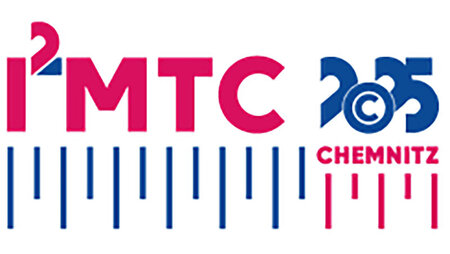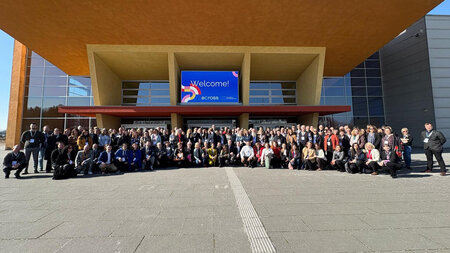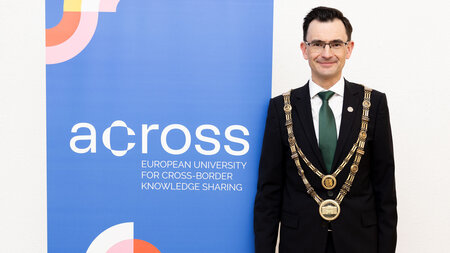A digital Co-Therapist
Chemnitz University presents novel assistance system at the globally biggest fair for medical technology MEDICA in Düsseldorf from November 13 till 16, 2017
-

Junior scientist Lars Lehmann from the Professorship of Digital Signal Processing and Circuit Technology at Chemnitz University tests the new therapy assistance system with his colleague Julia Richter in the functional laboratory of the Professorship for Sports Medicine/ Sports Biology. A camera system observes the movement of the test person. She receives real-time feedback during the exercise and can promptly correct motion errors with the instructions on the feedback display, for example, “Keep your upper body straight!” or “Bend your knee!”
After an accident or illness, a one-on-one supervisory relationship between patient and therapist is more or less a rarity. Often it is rather a one-to-eight or one-to-fifteen relationship. This results in a high supervisory expense for the therapists, who supervise numerous patients simultaneously and can not individually supervise the therapy process of each single patient. But the correct execution of the training exercise is important for the success of the therapy. For example, movements of the patient could have a too high or too small amplitude. Additionally, errors in the execution of the exercises can creep in over time and could have a negative impact on the recovery, if not corrected near-term.
This is where the work of the junior scientist group AssiSt at Chemnitz University of Technology steps in. They managed to simulate the feedback of a therapist in the form of a technological assistance system by using machine learning algorithms. “This way it is possible to analyze the motions of the patient in real time with the help of an intelligent sensor technology and subsequently give instructions on a feedback display – especially in times when the therapist is not able to supervise the therapy process”, explains Julia Richter from the project team. The new system on rehab assistance will be presented on the globally biggest fair for medical technology MEDICA in Düsseldorf from November 13 till 16, 2017, at booth 3/D94.
The developed demonstrator will be used for the first time with patients in clinical tests in the Chemnitz rehabilitation facility ADMEDIA Reha GmbH in 2018. “Our aim is to integrate and to optimize the human-machine-interface in everyday clinical practice as well as to evaluate the practicability”, foresees Richter. The junior researchers also aim at the prospective market maturity of the current demonstrator.
“MEDICA offers ideal opportunities to win additional partners and actors, making it possible for a broad range of users to profit from this innovative system in the near future”, expects Richter and adds: “We will answer all questions regarding the therapeutic and technological background of our assistance system in Düsseldorf and of course whenever wanted.” The research of the interdisciplinary research group is supported by the European Social Fund (ESF) and the Free State of Saxony.
Project homepage of“Assistierte Bewegungskontrolle in der Rehabilitation durch intelligente Sensortechnologie” (AssiSt) project: https://www.tu-chemnitz.de/etit/dst/projekte/assist/index.php
Further information is available from Christian Wiede, phone +49 371 531 33913, email christian.wiede@etit.tu-chemnitz.de and Julia Richter phone +49 371 531 37933, email julia.richter@etit.tu-chemnitz.de
(Translation: Alissa Hölzel)
Mario Steinebach
07.11.2017





